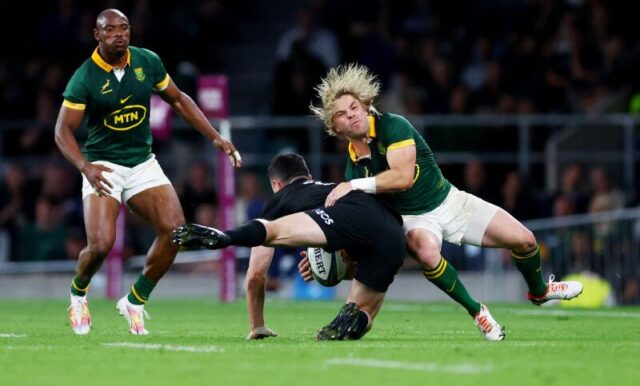The Springboks are constantly trying to sharpen up their discipline, especially when it comes to tackling height during matches, and it’s an area they want to be as clean as possible during the World Cup.
The Springboks are constantly trying to sharpen up their discipline, especially when it comes to tackling height during matches, and it’s an area they want to be as clean as possible during the World Cup.
Dominant victories by South Africa and France in the warm-up matches, and England’s struggles on the field, have been a big talking point ahead of the World Cup.
But the other talking point making more waves is how match officials approach head contact and World Rugby’s sanctions that come with it.
England captain Owen Farrell has been banned for a few pool clashes ahead of the 2023 tournament in a big blow to his struggling team, while his teammate Billy Vunipola will miss the opener against Argentina after he was banned for a dangerous tackle to the head.
On Friday, against the Springboks, Scott Barrett of New Zealand copped two yellow cards, one for charging into a ruck and making contact with the head of Malcolm Marx. Barrett, however, is free to play after an independent judicial committee decided that his sending off in the match against the Springboks was sufficient and that no further sanction was necessary.
Bok flank Pieter-Steph du Toit also received a yellow card for head contact in a tackle on All Blacks captain Sam Cane, but the bunker review system didn’t upgrade the card as there were significant mitigating factors.
Both players were in low body positions and bent at the hip when Du Toit attempted to wrap his arms around Cane as he carried the ball forward.
Bok captain Siya Kolisi said they are constantly working on getting their tackles right to stay a full complement on the field.
Du Toit was visibly distraught in the sin bin after receiving his yellow card, and it just shows how much pressure the Boks put on themselves to get that aspect of their defensive play right.
“We practice that every single time at training, and it becomes muscle memory,” Kolisi said about going low for tackles to avoid the possibility of sanctions against them.
“You get told this is too high, this is on the border or too much. We work on it as hard as we can.
“So, that when we go out on the field, we can be as physical as we can. Because the tackle technique is something we have trained over and over.
“Sometimes you do get caught out (with your height). But we manage our side of things by making sure we are making proper hits so that we don’t find ourselves in those positions. At the end of the day, World Rugby is trying to protect us, and they want to keep the game clean.”
And with the bunker review system in play during the World
Cup, there will be more scrutiny on players and their tackling techniques.
Officials can hand out a yellow card for a dangerous tackle and refer it to the bunker, where they can then decide to upgrade the card to a red or to have it stay yellow. It speeds up the decision-making process on the field, and fewer stoppages occur than in the past.
Bok coach Jacques Nienaber said after their 35-7 win over New Zealand that their defence is one of the aspects that they will be working on in this last camp in Corsica.
They started with the short camp, away from the spotlight yesterday, and will arrive at their base in Toulon on Sunday.
Their first pool match is against Scotland next Sunday in Marseille.
@LeightonK








